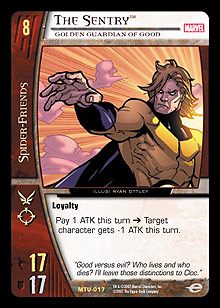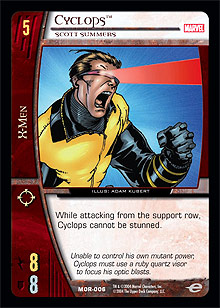
|
The Sentry™
Card# MTU-017


While his stats aren’t much bigger than those of the average 7-drop, Sentry’s “Pay ATK” power can drastically hinder an opponent’s attacking options in the late game.
Click here for more
|
|
|

|
|
|

 |
 |
|
|
| |
If you have been playing Vs. at home on your kitchen table and wondering, “Am I ready for a Pro Circuit Qualifier?” I’m going to help you try to decide. After experiencing the thrill of victory and the agony of defeat in more than 60 PCQ matches, I feel that these are the things you need to be armed with to qualify for the Pro Circuit. Most of these can be practiced at home.
 Know the Cards, Know the Rules Know the Cards, Know the Rules
A match in a Pro Circuit Qualifier demands much more attention to detail than a casual match you play at home. That’s not your friend on the other side of the table anymore. Your PCQ opponents will not allow you to take back wasted moves, so think three times before you make a decision. Read over all the cards you might face in a Sealed Pack tournament. Make sure you don’t Overload Cyclops, Scott Summers if he’s attacking from the support row. There are many abilities that you probably won’t have practiced against. Try to know as many as you can and don’t be afraid to read a card if you are not familiar with it.
Most PCQ opponents will know the rules thoroughly and force you to follow them. Make sure you play a resource before you start to recruit characters. Check the order of the turns, steps, and phases in the rulebook one more time before you play in a tournament. If you will be playing in a Constructed tournament, make sure you ask a judge before the tournament starts if you have any questions about the timing involved with your strategy. You can ask a judge before the PCQ starts, at a local tournament, or on an Internet forum. In the middle of your PCQ match, you can still ask for a ruling—that’s what the judges are there for. Many games are won and lost on plays that aren’t legal, so make sure you ask for a ruling if something seems wrong to you.
Some PCQ opponents will know the rules thoroughly and break them any time they can regardless. Make sure you don’t let Rogue, Anna Raven attack you from the support row, and don’t let your opponent attach Dual Sidearms during combat when you announce that she cannot attack. Always pay as much attention to your opponent’s play as you do to your own. Usually the opponent will say, “Oh yeah, you’re right.” Call a judge if your opponent insists on playing something outside the rules. Calmly explain what was played, and when and how it was played, and let the judge decide. No matter what happens, though, remember to keep your cool.
 Never Give Up, Never Surrender Never Give Up, Never Surrender
State of mind is extremely important. Keep your confidence at all times and in all situations. Don’t give up if you miss a drop. If you do not have a character to recruit on turn 3, you can often still win the game, and you can always learn more about the deck you are facing. It is possible that your opponent will not have a character to recruit on turn 4, and you could learn a lot from paying attention to the strategy your opponent is using. It’s also possible to make an impossible comeback. In a Gainesville PCQ, there was a Fantastic Four player who had the initiative and an awesome four-pack: Thing, The Ever-Lovin’ Blue-Eyed Thing with a Fantasticar, Hulk with a Fantasticar, Invisible Woman, Sue Storm with a Fantasticar, and Mr. Fantastic, Stretch to move the Fantasticars around. That player’s Brotherhood opponent had missed a drop and had only one character in play: Mystique, Shape-Changing Assassin. After a recruit of Magneto, Master of Magnetism and two Genosha activations that yielded two cards named Mystique and four cards named Magneto, the Lost City/Avalon Space Station combo crushed the four-pack like tin cans. A setup that looked unbeatable was gone in the blink of an eye.
Practice Makes Perfect
Preparing for a Pro Circuit Qualifier includes practicing your formation. Should your turn 4 play with the initiative go in the front row or support row? It helps to know ahead of time, and it’s something that testing can help you figure out. Of course, you may face something you didn’t expect, and Flying Kick throws everything up in the air, but your basic formation strategies should be ready before the tournament. Be ready for the attack and reinforcement decisions that you will face under pressure. Remember the importance of range and flight on both sides of the table, and don’t assume that your opponent is necessarily going to have either one. A huge attacker on the other side of the board is not quite so threatening if it must attack the front row. Any character without range that you control must be in the front row to counterattack on turns when the opponent has the initiative. Most of the time you spend thinking in a match at a PCQ will be during your formation step—practice will give you a big advantage.
 Defense Wins Tournaments Defense Wins Tournaments
Many PCQ games, just like many casual games, are won when an attack does not stun the defender. Flying Kick is sexy. Acrobatic Dodge is solid. Sometimes a strategy demands pure aggression on your part, but if there’s a way that you can play that will make one of your opponent’s attacks miss . . . do it. Combat Protocols makes Sentinels competitive, but it’s Cover Fire that makes them tier one. If anyone can get Circle Defense to work, there may be a bunch of exhausted adolescents at the top of the Pro Circuit. Teen Titans characters that feed Circle Defense can give the DEF to a character of another affiliation, so don’t be afraid to use it in Sealed Pack and Draft formats. Making a defender too strong to stun changes the game drastically. It can crack the confidence of an opponent, it can give you a chance to attack back on a turn that you do not have initiative, and it can be the difference between winning and losing.
Pay Attention to Detail
Keeping the endurance score yourself—both your endurance total and your opponent’s—will keep you closer to victory. Every time endurance is lost or gained, you need to mark it and then check it with your opponent to make sure you both agree on the totals. It seems tedious, but it gets to be routine. It does not need to hamper the flow of the game, and it’s a good habit to acquire. Many times, there will be a discrepancy of at least 1 endurance point if three turns have gone by without the double-check, and that 1 point could well decide the game. You can use pencil and paper, dice, or a counter, but you should always double-check the totals with your opponent.
It is necessary to concentrate especially hard on the first matches in a Pro Circuit Qualifier, as losing in the early rounds can seriously hurt your standings later. You will be nervous and excited when the tournament begins, but you need to be ready to do your best right away. Put all distractions out of your head. Take a deep breath. Focus on the game. Tiebreakers and pairings reward the winners of the early rounds. The Top 8 of a PCQ is usually made up of players with near-perfect records. You will be able to come back from an early loss, but the winners usually start winning right away.
There’s More to it than Matches
You must stay relaxed, even if your opponent is cold-blooded serious and especially if your opponent is trying to get you rattled. If you make a mistake, move on. Calmly call a judge when you have a question, and calmly accept a judge’s ruling whether you called for it or not. Stay calm at the end of a match whether you win or lose—often, you’ll learn more from losing than you will from winning. Don’t allow yourself to get angry during a PCQ, as anger clouds learning. Learn from your mistakes—figure out why you lost, and make the changes necessary to win next time. The swings in the game are dramatic enough without adding in emotional outbursts from the players. I have never seen a tournament player get upset and win in the same day.
Don’t forget to get some rest before the tournament. Each match can last up to one hour, and there will be at least fifteen minutes between rounds. A PCQ is more a marathon than a sprint, and many matches have been lost due to fatigue. Make sure you sleep well the night before. If you make the Top 8, you could be playing well into the evening. Leave your schedule clear. Add about four hours to the time you expected to play, and then you can feel relieved if the tournament ends before that. Staying until the wee hours of the morning to watch the finals is fun and educational even if you do not make the Top 8. A PCQ is an all-day event that needs to be planned for.
Another part of your plan will be your food route. Know the fastest way to get the sustenance you will need to stay sharp. Before the tournament starts, decide where you want to eat and drink. Whenever a match ends before the one-hour time limit, get something to eat and drink. Don’t try to find food five minutes before your next match. Playing a Vs. System match takes a clear head—nourish your body so your brain can work well. It’s also a good idea to figure out where the restrooms are and follow the same guidelines for those breaks.
Be Social
Pro Circuit Qualifiers are great for social networking. Bring some friends. Make new ones. Talk about the game. Share stories and strategies. Make plans to play together in the future. Enjoy the community that Vs. creates. Each match will give you another name and face that will be part of your world. As you participate in future PCQs, you will see these people again and again. There are very few mean people in the game, and even they share your interests. You can learn from everyone you see. Don’t be frightened. PCQs are fun. Even when I lose, I learn and I laugh. I have hundreds of new friends. I have thousands of new ideas for future strategies. I have an amazingly cool prize promo card that I won with a Sealed Deck that didn’t have a single 7-drop. Crazy things happen, and you could end up on the winning side of one. Try a PCQ whenever you can—you’ll be glad you did. |
| |
| Top of Page |
|
 |
|
|
 |